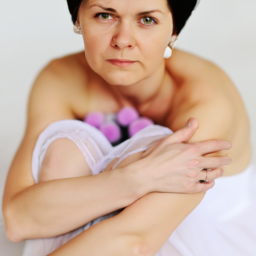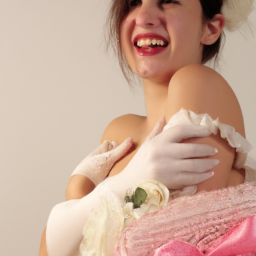Marriage and body image are two aspects of life that often intersect, yet are rarely discussed openly. In a society heavily influenced by media and societal norms, the pressure to maintain a certain physical appearance can take a toll on individuals, particularly within the context of marriage. The impact of body image on marital relationships can be significant, affecting self-esteem, intimacy, and overall satisfaction. This blog post aims to explore the intricate relationship between marriage and body image, shedding light on the challenges couples may face and providing guidance on fostering a healthy body image within the confines of matrimony. By delving into this often overlooked topic, we hope to encourage open dialogue, promote self-acceptance, and ultimately strengthen the bonds of love and partnership.
The Impact of Marriage on Body Image: Exploring the Relationship
Marriage is a significant milestone in one’s life, marking the union of two individuals in a lifelong commitment. While marriage brings about joy and companionship, it also introduces various changes and challenges, including the impact on body image. In this article, we will delve into the complex relationship between marriage and body image, exploring the factors that contribute to these changes and providing insights on how to navigate this aspect of married life.
The Role of Expectations and Societal Pressure
One of the primary factors influencing body image within marriage is the role of expectations and societal pressure. Before entering marriage, individuals may have certain ideals and expectations about their own and their partner’s physical appearance. These expectations can be shaped by societal standards of beauty, media representations, and personal desires.
When these expectations are not met, individuals may experience dissatisfaction with their own bodies or their partner’s appearance. This can lead to feelings of inadequacy, self-consciousness, and even resentment. It is important to recognize that these expectations are often unrealistic and can place unnecessary strain on the relationship.
To navigate this aspect of marriage, open and honest communication is crucial. Discussing individual insecurities and concerns with your partner can foster understanding and empathy. Additionally, challenging societal beauty standards and embracing body positivity can help both partners develop a healthier and more realistic perception of themselves and each other.
The Influence of Relationship Dynamics
The dynamics within a marriage can significantly impact body image. As couples navigate the ups and downs of married life, their emotional connection and support can either positively or negatively affect body image. Research suggests that individuals in supportive and loving relationships tend to have better body image compared to those in unsupportive or conflict-ridden marriages.
In a nurturing relationship, partners often provide reassurance, acceptance, and validation, which can boost self-esteem and promote a positive body image. On the other hand, if a marriage lacks emotional support, individuals may turn to their bodies as a source of control or seek validation through external means, such as seeking attention from others or engaging in unhealthy behaviors like extreme dieting or excessive exercise.
To foster a positive body image within marriage, it is essential to prioritize emotional intimacy and create a supportive environment. Regularly expressing love, appreciation, and acceptance for one another can strengthen the emotional bond and contribute to a healthier body image. Additionally, seeking professional help, such as couples therapy, can be beneficial in addressing underlying issues and improving relationship dynamics.
The Impact of Life Transitions and Parenthood
Life transitions, such as becoming parents, can have a profound impact on body image within marriage. Pregnancy, childbirth, and the demands of parenting can bring about significant physical changes, which may affect how individuals perceive their bodies and how they believe their partners perceive them.
Women, in particular, may experience body image concerns during and after pregnancy due to weight gain, stretch marks, or changes in breast size. Men may also face body image challenges as they navigate the transition into fatherhood and adjust to new roles and responsibilities.
It is crucial for couples to approach these changes with empathy, understanding, and support. Engaging in open conversations about body image concerns, acknowledging the challenges, and finding ways to adapt together can help couples navigate these transitions more effectively. Seeking professional guidance, such as attending parenting classes or joining support groups, can also provide valuable insights and strategies for maintaining a positive body image during this phase of marriage.
In conclusion, marriage and body image are intricately connected, with various factors influencing how individuals perceive themselves and their partners. By recognizing and addressing societal pressures, fostering supportive relationship dynamics, and navigating life transitions with empathy and understanding, couples can cultivate a positive body image within their marriage. Remember, it is the emotional connection, love, and acceptance that truly matter in a lifelong commitment.

Body Image Issues in Marriage: Understanding the Challenges
Marriage is a complex and beautiful journey that brings together two individuals in a lifelong commitment. However, like any other relationship, marriage also comes with its own set of challenges. One such challenge that many couples face is body image issues.
The Impact of Body Image on Marital Satisfaction
Body image refers to how an individual perceives and feels about their physical appearance. It plays a significant role in shaping self-esteem and overall well-being. When body image issues arise within a marriage, they can have a profound impact on the relationship and the individuals involved.
One of the most common challenges related to body image in marriage is the pressure to conform to societal beauty standards. Both men and women often feel the need to meet certain expectations when it comes to their physical appearance. This can lead to feelings of inadequacy, low self-esteem, and even resentment towards one’s partner.
Additionally, body image issues can create a barrier to intimacy and emotional connection within a marriage. When individuals are preoccupied with their own insecurities and self-doubt, it becomes challenging to fully engage and be present in the relationship. This can result in a lack of communication, emotional distance, and even sexual dissatisfaction.
Understanding the Root Causes of Body Image Issues
It is essential to recognize that body image issues in marriage are often rooted in deeper psychological and societal factors. These factors can include childhood experiences, media influence, cultural norms, and personal insecurities.
Childhood experiences play a significant role in shaping body image perceptions. Negative comments or experiences related to physical appearance during childhood can leave lasting scars and contribute to body image issues later in life. Similarly, exposure to unrealistic beauty standards portrayed in the media can create unrealistic expectations and dissatisfaction with one’s own body.
Cultural norms also play a crucial role in shaping body image. Different cultures have varying ideals of beauty, and individuals may feel pressured to conform to these ideals, even within their own marriages. This can create conflicts and feelings of inadequacy when one’s body does not align with the cultural expectations.
Nurturing a Healthy Body Image in Marriage
While body image issues in marriage can be challenging, they are not insurmountable. By understanding the root causes and taking proactive steps, couples can nurture a healthy body image within their relationship.
1. Open and Honest Communication: The foundation of any healthy relationship is communication. Encourage open and honest conversations about body image concerns, insecurities, and expectations. Create a safe space where both partners can express their feelings without judgment.
2. Challenge Societal Beauty Standards: Recognize that societal beauty standards are often unrealistic and unattainable. Encourage each other to embrace and celebrate individuality and diversity. Focus on inner qualities and strengths rather than solely on physical appearance.
3. Seek Professional Help: If body image issues are significantly impacting the marriage, consider seeking professional help. A therapist or counselor can provide guidance and support in navigating these challenges. They can help individuals develop coping strategies, improve self-esteem, and foster a healthier body image.
4. Practice Self-Care: Encourage self-care practices that promote overall well-being. Engage in activities that make you feel good about yourself, such as exercise, hobbies, and self-reflection. Taking care of oneself can positively impact body image and overall marital satisfaction.
5. Focus on Emotional Connection: Shift the focus from physical appearance to emotional connection and intimacy. Engage in activities that promote emotional bonding, such as deep conversations, shared experiences, and acts of kindness. Building a strong emotional connection can reduce the emphasis on physical appearance within the marriage.
Remember, body image issues in marriage are common, and it is essential to approach them with empathy, understanding, and patience. By working together as a team, couples can overcome these challenges and cultivate a healthy and fulfilling marital relationship.

Promoting Positive Body Image in Marriage: Strategies for a Healthy Relationship
Introduction
In today’s society, body image issues have become increasingly prevalent, affecting individuals of all ages and backgrounds. Within the context of marriage, these concerns can significantly impact the overall health and happiness of the relationship. It is crucial for couples to actively promote positive body image and foster a supportive environment where both partners feel comfortable and confident in their own skin. In this article, we will explore effective strategies that can help couples maintain a healthy body image within their marriage.
1. Open Communication
Effective communication is the foundation of any successful marriage. When it comes to body image, it is essential for couples to openly discuss their insecurities, concerns, and desires. By creating a safe space for dialogue, partners can express their feelings without fear of judgment or criticism. Encourage each other to share personal experiences, thoughts, and emotions related to body image. This open communication allows for a deeper understanding of each other’s perspectives and promotes empathy and support.
Additionally, it is important to actively listen to your partner’s concerns and validate their feelings. Avoid dismissing or trivializing their insecurities, as this can further exacerbate the issue. Instead, offer reassurance, understanding, and encouragement. Remember, a strong partnership is built on mutual respect and support.
Furthermore, discussing shared goals and aspirations regarding body image can help create a sense of unity and teamwork within the marriage. By working together towards a common objective, couples can motivate and inspire each other to make positive changes and embrace self-acceptance.
2. Cultivating a Positive Environment
The environment in which a couple lives plays a significant role in shaping body image perceptions. It is crucial to create a positive and affirming atmosphere that celebrates diverse body types and rejects harmful societal standards. Here are some strategies to cultivate a positive environment:
A. Media Consumption: Limit exposure to media that promotes unrealistic beauty standards. Encourage consuming content that celebrates body diversity and promotes self-love and acceptance.
B. Language: Be mindful of the language used when discussing bodies. Avoid derogatory or negative comments about your own or your partner’s appearance. Instead, focus on highlighting each other’s strengths, talents, and inner qualities.
C. Social Circle: Surround yourselves with supportive friends and family members who embrace body positivity. Engage in activities and socialize with individuals who promote a healthy and balanced view of body image.
By consciously creating a positive environment, couples can reduce the impact of external influences that contribute to negative body image and foster a more nurturing and supportive relationship.
3. Prioritizing Self-Care
Self-care is an integral component of maintaining a positive body image within marriage. When individuals prioritize their physical and emotional well-being, it positively impacts their self-perception and overall confidence. Here are some self-care strategies couples can incorporate into their daily lives:
A. Regular Exercise: Engage in physical activities together that are enjoyable and promote overall health. This can include going for walks, dancing, or practicing yoga. Exercise not only benefits physical health but also releases endorphins, boosting mood and self-esteem.
B. Healthy Eating Habits: Encourage each other to adopt balanced and nutritious eating habits. Focus on nourishing the body rather than restrictive diets or fad trends. Prepare and enjoy meals together, making it a bonding experience.
C. Mindfulness and Relaxation: Incorporate mindfulness practices such as meditation or deep breathing exercises into your daily routine. This can help reduce stress, increase self-awareness, and promote a positive body-mind connection.
By prioritizing self-care, couples can reinforce the importance of self-love and self-acceptance, setting a positive example for each other and promoting a healthy body image within the marriage.
Conclusion
Promoting positive body image within a marriage is a continuous process that requires open communication, a supportive environment, and a commitment to self-care. By implementing these strategies, couples can create a strong foundation of love, acceptance, and mutual respect. Remember, a healthy body image not only benefits individual well-being but also strengthens the bond and overall happiness within the marriage.
I’ll leave you with these final thoughts
Marriage is a sacred bond that unites two individuals, but it also has a significant impact on one’s body image. Many couples experience changes in their physical appearance after tying the knot, which can have both positive and negative effects on their self-perception. On one hand, marriage can lead to a sense of security and acceptance, allowing individuals to feel more comfortable in their own skin. However, it can also bring about pressure to maintain a certain appearance, leading to body dissatisfaction and self-consciousness.
For some couples, marriage offers a sense of security and acceptance that allows them to embrace their bodies as they are. Sharing a life with someone who loves and cherishes them can boost their self-confidence and foster a positive body image. They feel comfortable in their own skin, knowing that their partner accepts them for who they are, regardless of any physical changes that may occur over time.
On the other hand, marriage can also bring about a sense of pressure to maintain a certain appearance. As couples settle into married life, they may find themselves comparing their bodies to societal ideals or even to their partner’s physique. This can lead to feelings of insecurity and self-consciousness, as individuals strive to meet unrealistic beauty standards. The fear of not being attractive enough to their spouse can create a constant battle with body dissatisfaction, which can take a toll on their overall well-being and the quality of their relationship.
In conclusion, marriage has a profound impact on body image, with both positive and negative consequences. While it can provide a sense of security and acceptance, allowing individuals to feel comfortable in their own skin, it can also lead to pressure and self-consciousness. It is important for couples to communicate openly about their feelings and expectations, fostering a supportive and accepting environment that promotes a healthy body image for both partners.
Common Questions and Answers:
Q1: How does marriage affect body image?
A1: Marriage can have both positive and negative effects on body image. On one hand, being in a committed relationship can provide emotional support and a sense of security, which can boost self-esteem and body confidence. On the other hand, some individuals may experience pressure to meet societal expectations or compare themselves to their spouse, leading to body dissatisfaction. It is important to remember that the impact of marriage on body image varies from person to person and depends on various factors such as individual experiences, cultural influences, and personal values.
Q2: How can body image issues affect a marriage?
A2: Body image issues can potentially impact a marriage in several ways. When one or both partners struggle with body dissatisfaction, it may lead to decreased intimacy, communication barriers, and reduced sexual satisfaction. Moreover, constant preoccupation with appearance can result in low self-confidence and self-worth, potentially affecting overall relationship satisfaction. It is crucial for couples to foster open and supportive communication, seek professional help if needed, and focus on building a strong emotional connection beyond physical appearance.
Q3: What can individuals do to improve their body image within a marriage?
A3: Improving body image within a marriage involves both individual and relational efforts. Firstly, practicing self-acceptance and self-compassion is essential. Engaging in activities that promote overall well-being, such as regular exercise, a balanced diet, and self-care routines, can also positively influence body image. Additionally, open and honest communication with one’s partner about insecurities and concerns can foster understanding and support. Seeking professional counseling or therapy can be beneficial for individuals and couples struggling with body image issues.
Q4: How can couples support each other’s body image in a marriage?
A4: Supporting each other’s body image in a marriage requires empathy, respect, and active communication. Encouraging positive self-talk, complimenting each other on non-appearance-related qualities, and expressing love and acceptance can help boost self-esteem and body confidence. Engaging in activities together that focus on health and well-being rather than appearance, such as exercising as a team or cooking nutritious meals, can promote a positive body image within the relationship. It is crucial to create a safe and non-judgmental space where both partners feel comfortable discussing their insecurities and concerns.
Q5: When should individuals seek professional help for body image issues in a marriage?
A5: Seeking professional help for body image issues in a marriage is recommended when the impact on one’s well-being and relationship becomes significant. If body image concerns lead to persistent feelings of anxiety, depression, or significantly affect daily functioning, it may be beneficial to consult a therapist or counselor who specializes in body image and relationship issues. They can provide guidance, support, and evidence-based interventions tailored to the individual’s needs, helping them navigate and overcome these challenges within the context of their marriage.

About Sarah:
Sarah is a certified marriage counselor and co-founder of SaveOurVows.com. Her expertise lies in helping couples reignite the spark in their relationships and create a lasting bond built on trust and understanding. As a devoted wife and mother, Sarah draws from her personal experiences and professional training to offer valuable guidance to couples seeking to save their marriages. Her articles focus on nurturing emotional connection and fostering a supportive environment where love can thrive.
About John:
John is a relationship expert and co-founder of SaveOurVows.com. With a Master’s degree in Marriage and Family Therapy, John is passionate about helping couples navigate the challenges that come with marriage. Having experienced the highs and lows in his own relationship with Sarah, he understands the complexities of married life and believes in the power of effective communication and emotional intimacy. John’s articles offer practical tips and insights to empower couples in their journey to a stronger and more fulfilling marriage.
Together as a Team:
John and Sarah’s mission is to provide a compassionate and supportive platform for couples in need of guidance and encouragement. Through their collaborative efforts, they aim to inspire love and commitment in marriages worldwide. As a couple themselves, they embody the principles they teach, and their dedication to helping others strengthen their relationships is the driving force behind SaveOurVows.com.
Favorite Topics:
Rekindling Romance: John and Sarah believe that rekindling the romance is an essential aspect of any successful marriage. Their articles on this topic offer creative ideas and practical strategies to keep the passion alive.
Effective Communication: Communication is the foundation of a healthy relationship. John and Sarah share expert tips to improve communication between couples and resolve conflicts constructively.
Building Trust: Trust is paramount in any marriage. Through their articles, they help couples rebuild trust and create a secure and loving environment.
Join Sarah and John’s Journey:
Sarah and John invite you to join them on their journey of empowering couples to save their vows and build lasting and fulfilling marriages. Their insights and advice aim to make a positive impact on your relationship, fostering a bond that stands the test of time.






